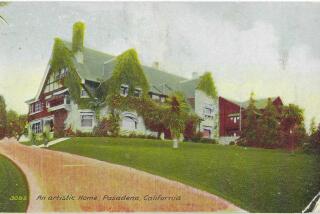ORANGE : Museum in Old Town Is City’s First
The Old Town neighborhood is famed for its Victorian homes and quaint shops. But now it will also be known as the home of the city’s first museum.
Pitcher Park, at the southwest corner of Cambridge Street and Almond Avenue, contains 33 types of vegetation, as well as restorations of the original barn and honey house built on the property by Orange pioneers Henry and Grace Pitcher.
“We feel that our property is a unique contribution to the city of Orange,” said Alice Pitcher, an Orange resident and daughter-in-law of the Pitchers, who donated the land to the city.
Henry and Grace Pitcher moved to Orange from Kansas with their son Laurence in 1912.
Henry Pitcher was a real estate broker with an office in the downtown plaza, but the family also farmed walnuts and apricots, as well as raised chickens, goats and horses.
After Henry Pitcher died, Laurence and Alice Pitcher continued to live on the property in a one-story bungalow until Laurence’s death in 1988.
The Pitchers requested that their house not be restored, saying it had no historical significance.
Yet the newly renovated barn and honey house offer up a host of nearly century-old Pitcher memorabilia, such as the family’s smudge pots, the small oil-burning stoves used to prevent crops from freezing when the temperature dropped.
“They (smudge pots) were very polluting,” Pam Doss, a city recreation supervisor, said during a tour of the property. “They certainly wouldn’t allow them today.”
As part of the property’s renovation, Grace Pitcher’s herb garden was restored and new flower gardens planted.
In addition, Pitcher Park contains Orange’s new fire museum, which features a man-pulled fire wagon used in 1907. The museum shares a part of the Pitcher barn.
“I thought it (the park) would be nice, but I didn’t realize how nice,” said Maxine Spalding, a resident of the city for more than 35 years. “They have landscaped it beautifully.”
But there are doubters. Although the land came free, developing the property cost about $500,000 at a time when city funds are increasingly strained.
“I think it’s a sin,” said Corrine Schreck, an Orange civic activist. “The money should have gone to another one of the parks in the area.”
City officials counter by saying that about one-third of the money spent came from special county and state grants, with the remainder paid from park acquisition and development funds.
The park will be open every day from 9 a.m. to dusk, but the museum itself will only be open and staffed on Saturdays and Sundays from 11 a.m. to 3 p.m. because of budget constraints.
The city, however, will open up the museum portion of the park, which has no admission fee, to group tours by appointment.
The park will also be available for private receptions.
Doss said the city plans to establish a program of volunteer docents to give tours of the site. And donations of relics of old Orange continue to be sought.
For further information about the museum, the volunteer docent program and how to make donations to the museum or rent the site, call (714) 744-7268.
More to Read
Sign up for Essential California
The most important California stories and recommendations in your inbox every morning.
You may occasionally receive promotional content from the Los Angeles Times.










